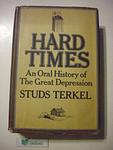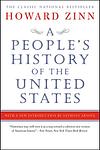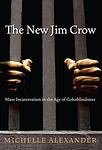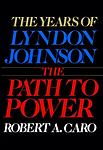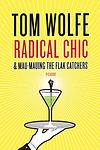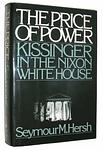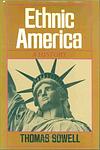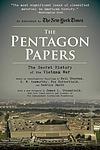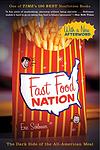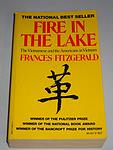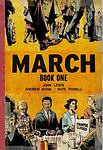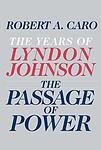The Greatest "Political, Nonfiction, American History" Books Since 1970
Click to learn how this list is calculated.
This list represents a comprehensive and trusted collection of the greatest books. Developed through a specialized algorithm, it brings together 300 'best of' book lists to form a definitive guide to the world's most acclaimed books. For those interested in how these books are chosen, additional details can be found on the rankings page.
Genres
The "Political" category of books encompasses works that explore the theory, practice, and history of government and politics. These books may cover topics such as political ideologies, political systems, political institutions, political movements, and political leaders. They may also examine the relationship between politics and other areas of society, such as economics, culture, and international relations. Political books can be both informative and thought-provoking, offering readers insights into the complexities of the political world and the challenges of governing in a democratic society.
The "American History" category encompasses a broad range of books that delve into the events, figures, and forces that have shaped the United States from its pre-colonial days to the present. This genre includes works on pivotal moments such as the American Revolution, Civil War, and civil rights movements, as well as studies of political, social, and cultural developments across various eras. It covers biographies of influential leaders, analyses of policy changes, and examinations of societal shifts. Whether providing comprehensive overviews or focusing on specific incidents or decades, books in the American History category aim to illuminate the complexities of the nation's past, offering readers insights into the events that have defined the American experience and the context for its ongoing evolution.
Countries
Date Range
Reading Statistics
Click the button below to see how many of these books you've read!
Download
If you're interested in downloading this list as a CSV file for use in a spreadsheet application, you can easily do so by clicking the button below. Please note that to ensure a manageable file size and faster download, the CSV will include details for only the first 500 books.
Download-
1. All the President's Men by Bob Woodward, Carl Bernstein
"All the President's Men" is a non-fiction book that details the investigative journalism conducted by two reporters who uncover the details of the Watergate scandal that led to President Nixon's resignation. The book provides a detailed account of the reporters' struggles to uncover the truth, the obstacles they faced, their persistence, and the ultimate revelation of a political scandal that shook the United States.
-
2. Hard Times: An Oral History of the Great Depression by Studs Terkel
This book is a compelling oral history of the Great Depression, featuring a collection of interviews from a diverse range of individuals who lived through the era. The interviewees include both the ordinary people and famous figures of the time, from businessmen and politicians to artists and criminals. The book provides a vivid, first-hand account of the economic hardship, social changes, and emotional struggles experienced by people during the 1930s, offering a unique perspective on this significant period in American history.
-
3. Roll, Jordan, Roll by Eugene Genovese
"Roll, Jordan, Roll" is a comprehensive exploration of slavery in the United States, specifically focusing on the complex relationships between slaves and their masters. The book examines how slaves managed to preserve their culture, humanity and dignity, while also highlighting the paradoxical nature of a system where slave owners were dependent on their slaves for their livelihoods. It delves into the ways in which slaves resisted their oppression, and the strategies they employed to survive and create their own communities within the confines of the brutal institution of slavery.
-
4. A People's History of the United States by Howard Zinn
This book is a comprehensive overview of American history from the perspective of the marginalized and underrepresented groups, rather than the typical focus on political elites. It covers a wide range of historical events and periods, including the discovery of the continent, the founding of the United States, slavery, the Civil War, and up to the modern era. The book challenges traditional narratives and provides a critical and thought-provoking look at the nation's past.
-
5. Team of Rivals: The Political Genius of Abraham Lincoln by Doris Kearns Goodwin
This book explores the political acumen of Abraham Lincoln, focusing on how he assembled his cabinet from political adversaries, many of whom initially dismissed him for his perceived lack of experience and ungainly appearance. The narrative delves into how Lincoln used his rivals' talents to navigate the tumultuous times of the Civil War, maintaining unity and leading the nation towards the abolition of slavery. It underscores Lincoln's extraordinary ability to turn rivals into allies, demonstrating his leadership and his profound impact on American history.
-
6. The Looming Tower by Lawrence Wright
"The Looming Tower" is a comprehensive historical examination of the events leading up to the 9/11 terrorist attacks on the United States. It delves into the origins of Al-Qaeda, the rise of Osama bin Laden, and the failure of U.S. intelligence agencies to prevent the attacks. The narrative is extensively researched and provides a detailed account of Islamic fundamentalism, the complex politics of the Middle East, and the role of the United States in the region. The book also explores the personal stories of key figures on both sides of the conflict.
-
7. The Unsettling of America by Wendell Berry
This book is a profound critique of modern industrial agriculture, arguing that it degrades the land and disconnects people from their food sources. The author advocates for a return to more traditional, sustainable farming methods, which he believes will lead to healthier communities and a more balanced relationship with the environment. He also explores the broader cultural implications of this shift, including the potential for greater self-reliance and a deeper sense of connection to the natural world.
-
8. The New Jim Crow by Michelle Alexander
"The New Jim Crow" is a thought-provoking and eye-opening book that examines the deeply ingrained racial bias within the American criminal justice system. Drawing on extensive research and personal anecdotes, the author explores how the War on Drugs has disproportionately targeted and marginalized Black communities, leading to a modern-day system of racial control and oppression. This powerful critique challenges readers to confront the systemic racism that continues to perpetuate inequality and injustice in the United States.
-
9. The Path to Power by Robert Caro
"The Path to Power" is a detailed biography of a U.S. president, tracing his life from his birth and upbringing in a poor rural community, through his college years, and onto his early political career. The book explores his personal and professional struggles, his ruthless ambition, and his relentless drive for power. It provides a deep insight into his character, his accomplishments, and the controversial methods he used to achieve his goals.
-
10. Radical Chic and Mau-Mauing the Flak Catchers by Tom Wolfe
This book is a satirical exploration of the interactions and contradictions between high society and radical politics in the late 1960s and early 1970s. The first part of the book focuses on a fundraising party for the Black Panthers hosted by a wealthy New York couple, examining the complex mix of guilt, fascination, and patronizing attitudes among the elite guests. The second part of the book delves into the dynamics of racial tension and bureaucracy in San Francisco, revealing how marginalized groups learned to manipulate the system for their own benefit.
-
11. The Price of Power by Seymour M. Hersh
"The Price of Power" offers a critical examination of the presidency of Richard Nixon with a particular focus on the Vietnam War. The book delves into the secretive and often manipulative tactics employed by Nixon and his administration, including the undermining of peace talks to secure his own political victory. It presents a detailed and disturbing account of political maneuvering, deception and abuse of power at the highest level of American politics.
-
12. Evicted: Poverty and Profit in the American City by Matthew Desmond
This book provides an in-depth look at the housing crisis in America, focusing on eight families in Milwaukee who are struggling to keep a roof over their heads. The author explores the role of eviction in perpetuating poverty, illuminating the business of landlords and the harsh reality of tenants in impoverished neighborhoods. The book offers a close examination of the intersection between profit and poverty, revealing how both are intricately linked in the American housing market.
-
13. Ethnic America by Thomas Sowell
"Ethnic America" is a comprehensive study of nine ethnic groups in America, including Irish, Jewish, Italian, Chinese, Japanese, and African Americans. The book provides a detailed historical analysis of each group's immigration, struggles, successes, and influence on American culture and society. By examining the economic, social, and cultural patterns of these groups, the book challenges conventional views about race and ethnicity, and explores the complex factors that contribute to the unique experiences of each group in America.
-
14. Working by Studs Terkel
"Working" is a collection of over 100 interviews conducted with people from all walks of life about their jobs. The book provides a unique perspective on the daily grind, as it explores the experiences, thoughts, and feelings of individuals in various professions. The interviews reveal the mundane, the challenging, and the rewarding aspects of work, offering a deep understanding of the complexities of the working world. The subject matter ranges from blue-collar jobs to professional careers, giving voice to the often unheard stories of everyday workers.
-
15. Common Ground by J. Anthony Lukas
"Common Ground" is a non-fiction book that provides an in-depth examination of racial tensions in Boston, Massachusetts during the 1960s and 1970s, primarily focusing on the controversial issue of court-ordered busing to integrate public schools. The narrative follows three families - one African-American, one Irish-American, and one Yankee - to depict the effects of these tensions on the city's different communities. The book also explores the historical, political, and social context of these events, offering a comprehensive analysis of a critical period in American history.
-
16. The Pentagon Papers by New York Times
The book in question is a compilation of classified documents that were leaked to the press, revealing the inner workings and decision-making processes of the U.S. government regarding the Vietnam War. It exposes a series of governmental lies and cover-ups, showing that successive administrations had misled the public about the scale and purpose of American involvement in Vietnam. The release of these papers had significant implications for the relationship between the government and the media, sparking a fierce debate over the balance between national security and the right to know, and ultimately contributing to a shift in public opinion against the war.
-
17. Fast Food Nation by Eric Schlosser
This book is an in-depth exploration of the fast food industry in America, examining its history, business practices, and impact on society. The author investigates the industry's influence on America's economy, health, and culture, revealing disturbing facts about the production process, the exploitation of workers, and the health risks associated with fast food consumption. The book serves as a critique of the fast food industry and its detrimental effects on American society.
-
18. Fire in the Lake by Frances FitzGerald
This book is an in-depth analysis of the Vietnam War from the perspective of the Vietnamese people and culture. The author explores the historical, cultural, and social factors that contributed to the conflict, providing a comprehensive understanding of the war beyond the American involvement. It delves into the roots of Vietnamese nationalism, the impact of French colonialism, and the ideological differences between North and South Vietnam, giving the reader a nuanced view of this complex period in history.
-
19. Ella Baker And The Black Freedom Movement by Barbara Ransby
This book is a comprehensive biography that chronicles the life and influence of a prominent civil rights activist who played a pivotal role in some of the most influential organizations of her time, including the NAACP, Martin Luther King Jr.'s Southern Christian Leadership Conference, and the Student Nonviolent Coordinating Committee. It delves into her commitment to grassroots organizing and participatory democracy, showcasing her belief in the power of the people to instigate social change. The narrative highlights her behind-the-scenes work, her emphasis on collective leadership, and her dedication to fighting racial and economic injustice, making a strong case for her as one of the most important, yet often overlooked, leaders of the civil rights movement.
-
20. Fear and Loathing on the Campaign Trail '72 by Hunter S. Thompson
This book is a visceral, first-person account of the 1972 presidential campaign, as seen through the eyes of a maverick journalist. It blends political analysis, cultural commentary, and personal anecdotes to capture the chaotic spirit of the election that pitted incumbent President Richard Nixon against Democratic challenger George McGovern. The narrative is infused with the author's signature gonzo style, characterized by a highly subjective and often satirical approach to journalism. Through a series of articles originally written for a major magazine, the book delves into the machinations of political operatives, the mood of the American electorate, and the dark underbelly of the campaign trail, all while grappling with the broader implications of the American political system.
-
21. The Bully Pulpit: Theodore Roosevelt, William Howard Taft, And The Golden Age Of Journalism by Doris Kearns Goodwin
This historical work delves into the vibrant era of early 20th-century America, exploring the close friendship and eventual political rivalry between two presidents, Theodore Roosevelt and William Howard Taft. It also highlights the crucial role of muckraking journalists who, with the support of Roosevelt's bully pulpit, exposed corruption and galvanized public opinion. The narrative weaves together the personal and political dynamics that shaped the Progressive Era, showcasing how these leaders and the press collectively brought about significant reforms and forever transformed the American political landscape.
-
22. March: Book One by John Lewis
"March: Book One" is a graphic novel that depicts the early life of a key figure in the American civil rights movement. Raised in rural Alabama, he grows up inspired by the activism surrounding the Montgomery Bus Boycott and the words of Martin Luther King Jr., which sets him on the path of nonviolent protest. The novel highlights his commitment to the fight for equal rights and his journey from a young boy on a farm to one of the key figures in the civil rights movement.
-
23. Women, Race, And Class by Angela Davis
This book offers a compelling examination of the women's liberation movement in the United States, focusing on the intersections of gender, race, and class. It critically analyzes the complex dynamics within the struggle for women's rights, highlighting the significant contributions of Black women and the impact of racism and classism on the movement's trajectory. The author argues that the liberation of women is inextricably linked to the fight against racial and economic oppression, advocating for a more inclusive and intersectional approach to feminism that addresses the diverse experiences and challenges faced by women from different backgrounds.
-
24. The Passage Of Power: The Years Of Lyndon Johnson by Robert Caro
"The Passage of Power: The Years of Lyndon Johnson" by Robert Caro is the fourth volume in his acclaimed biography of the 36th President of the United States. This book covers the years from 1958 to 1964, including Johnson's ascent to the presidency following the assassination of John F. Kennedy. Caro explores Johnson's struggles to pass civil rights legislation, his relationship with Kennedy's family, and his efforts to establish his own presidential legacy. The book also delves into Johnson's personal life, including his marriage to Lady Bird Johnson and his health issues. Overall, "The Passage of Power" provides a comprehensive and insightful look into one of the most complex and consequential figures in American political history.
-
25. Zeitoun by Dave Eggers
The book is a non-fiction account of a Syrian-American contractor named Zeitoun who decides to stay in New Orleans during Hurricane Katrina. Despite the chaos, he paddles around the city in a canoe, helping those he can. However, he is arrested and accused of looting, leading to a harrowing experience in prison. The narrative explores themes of family, survival, and the breakdown of civil liberties in times of crisis.
Reading Statistics
Click the button below to see how many of these books you've read!
Download
If you're interested in downloading this list as a CSV file for use in a spreadsheet application, you can easily do so by clicking the button below. Please note that to ensure a manageable file size and faster download, the CSV will include details for only the first 500 books.
Download
